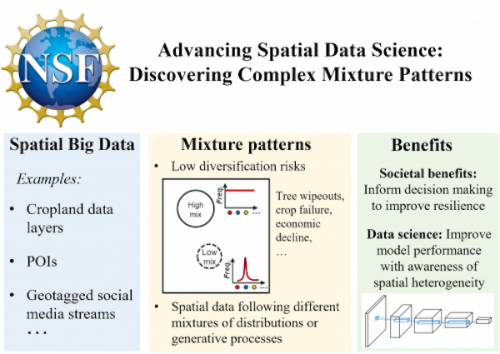Yiqun Xie (PI), Assistant Professor in Geospatial Information Science, receives the NSF Computer and Information Science and Engineering (CISE) Research Initiation Initiative (CRII) award to investigate novel data science techniques for a new spatial pattern family – complex mixture patterns.
The project titled “CRII: III: Discovering Complex Mixture Patterns in Spatial Data to Advance Resilience of Communities” is funded through CISE’s Information & Intelligent Systems (IIS) division, and the Information Integration and Informatics (III)program. Collaborators of the project are Professors Chris Justice, Leila De Floriani and Laixiang Sun from UMD, and Assistant Professor Jia Yu from WSU.
The new techniques aim to advance the knowledge of:
- Spatial pattern mining by expanding traditional pattern families (e.g., clustering, colocation, anomalies) with new mixture patterns, which aim to find regions with interesting mixture signatures (e.g., high or low diversification of species, crops, business types) in space and time;
- Machine/deep learning by automatically and explicitly capturing spatial heterogeneity – which is commonly embedded in general spatial datasets (e.g., mixtures of heterogeneous data distributions in space) – during training to enhance model performance.
The new patterns also aim to improve resilience of communities (in face of climate change, food shortage, the pandemic, etc.) with early warnings of vulnerable mixtures (e.g., declining diversification of crops or business types), and improve spatial fairness/equity in decision-making (e.g., reducing spatial biases in machine learning).




